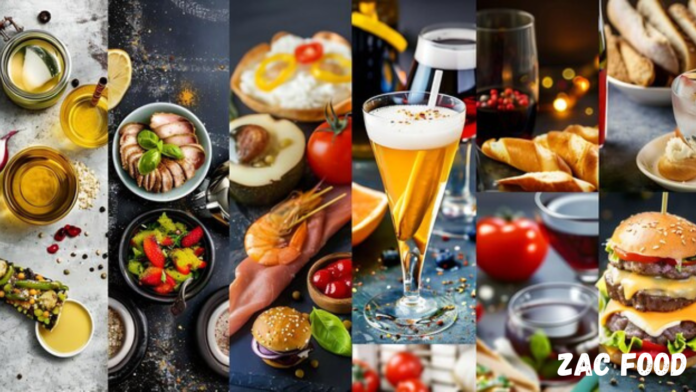The food and beverage industry is undergoing a radical transformation, driven by technological advancements, sustainability concerns, and a growing focus on health and wellness. From plant-based innovations to personalized nutrition, these trends are not just fleeting fads but significant shifts that are changing the way we eat and drink. As consumers become more conscious of what they consume and how it impacts their bodies and the planet, the industry is responding with innovations that promise to redefine our dining experiences. Let’s dive into the revolutionary food and beverage trends that are set to change how we eat and drink.
Plant-Based Innovations
Rise of Plant-Based Meats
One of the most significant food and beverage trends in recent years has been the rise of plant-based meats. Companies like Beyond Meat and Impossible Foods have made headlines with their meat alternatives that closely mimic the taste, texture, and appearance of traditional beef. What’s driving this trend? For starters, there’s the environmental impact. Producing plant-based meats requires significantly less water, land, and energy compared to raising livestock, making it a more sustainable option. Additionally, these products offer nutritional benefits such as lower saturated fat and cholesterol levels, appealing to health-conscious consumers. The plant-based meat trend is no longer just for vegetarians; it’s attracting meat lovers who are curious about reducing their environmental footprint without sacrificing flavor.

Dairy-Free Revolution
The dairy aisle has also seen a dramatic shift with the rise of dairy-free alternatives. Almond, oat, and soy milk are just a few of the many options now available to consumers. This dairy-free revolution is part of a broader trend toward plant-based diets and is driven by factors such as lactose intolerance, veganism, and environmental concerns. These plant-based dairy products often come with added vitamins and minerals, making them a nutritious alternative to traditional dairy. The growing demand for these products has led to rapid market expansion, with major food brands now offering a wide range of dairy-free options, from ice cream to cheese.
Sustainable and Ethical Eating
Farm-to-Table Movement
The farm-to-table movement is one of the most impactful food and beverage trends in promoting sustainable and ethical eating. This trend emphasizes sourcing food directly from local farms, ensuring that the ingredients are fresh and sustainably produced. The benefits of this approach are manifold. For consumers, it means fresher, more flavorful food with a smaller carbon footprint. For local farmers, it provides a direct market for their products, supporting their livelihoods and promoting regional agriculture. As more people become aware of the environmental and social implications of their food choices, the farm-to-table movement continues to grow, reshaping the way we think about food sourcing and consumption.
Zero-Waste Cooking
Another significant trend in the realm of sustainability is zero-waste cooking. This approach to food preparation minimizes waste by using every part of the ingredient, composting scraps, and creatively repurposing leftovers. Restaurants and home cooks alike are embracing zero-waste cooking as a way to reduce their environmental impact. Popular chefs are leading the charge, with some even offering entire menus based on zero-waste principles. For home cooks, adopting zero-waste practices can be as simple as planning meals more carefully, using leftovers in creative ways, and composting kitchen scraps. This trend is not just about sustainability; it’s also about encouraging a more mindful and resourceful approach to cooking.
Technological Advances in Food and Beverage
Lab-Grown Meat
Lab-grown meat, also known as cultured or cell-based meat, is one of the most exciting technological advancements in the food and beverage industry. This innovation involves growing meat from animal cells in a lab, offering a potential solution to the ethical and environmental issues associated with traditional meat production. Lab-grown meat could significantly reduce the need for livestock farming, which is a major contributor to greenhouse gas emissions, deforestation, and water pollution. While the technology is still in its early stages and faces challenges in scaling up production, the potential benefits are enormous. As consumer awareness of these issues grows, lab-grown meat is poised to become a major player in the future of food.
Food Delivery and Automation
The rise of automation in food delivery and preparation is another key trend reshaping the industry. Robotic kitchens, automated delivery systems, and smart appliances are making food more accessible, convenient, and personalized. During the COVID-19 pandemic, the demand for food delivery skyrocketed, accelerating the adoption of these technologies. Companies are now investing in innovations like drone delivery, AI-powered ordering systems, and even robots that can cook entire meals. These advancements are not just about convenience; they’re also about improving efficiency and reducing human error in food preparation. As we look to the future, automation is likely to play an even larger role in how we eat, whether it’s at home or in a restaurant.
Health and Wellness Trends
Functional Foods
Functional foods, which offer additional health benefits beyond basic nutrition, are gaining popularity as more consumers seek to improve their overall well-being through diet. This trend includes foods like probiotics, superfoods, and products infused with CBD, which are believed to support various health outcomes such as improved digestion, enhanced immunity, and stress relief. The appeal of functional foods lies in their ability to deliver specific health benefits in a natural and accessible form, making them a key player in current food and beverage trends. As more research supports the efficacy of these foods, their presence in grocery stores and on restaurant menus is expected to grow.Personalized nutrition is revolutionizing the way we think about diet and health. Advances in DNA and microbiome testing are enabling individuals to receive tailored dietary recommendations based on their unique genetic makeup and health needs. Companies are now offering personalized meal plans and supplements designed to optimize health outcomes, from weight management to improved mental clarity. This trend reflects a broader shift towards more individualized approaches in health and wellness, aligning diet more closely with personal health data. As personalized nutrition becomes more accessible, it’s likely to become a staple in the landscape of food and beverage trends.
Personalized Nutrition
Personalized nutrition is revolutionizing the way we think about diet and health. Advances in DNA and microbiome testing are enabling individuals to receive tailored dietary recommendations based on their unique genetic makeup and health needs. Companies are now offering personalized meal plans and supplements designed to optimize health outcomes, from weight management to improved mental clarity. This trend reflects a broader shift towards more individualized approaches in health and wellness, aligning diet more closely with personal health data. As personalized nutrition becomes more accessible, it’s likely to become a staple in the landscape of food and beverage trends.
Beverage Trends Redefining the Market
Non-Alcoholic Spirits
Non-alcoholic spirits and cocktails are rapidly gaining traction as a significant trend in the beverage industry. As consumers become more health-conscious and the sober-curious movement grows, the demand for sophisticated, alcohol-free alternatives has surged. These beverages mimic the complex flavors of traditional spirits without the alcohol content, allowing consumers to enjoy the social aspects of drinking without the negative effects of alcohol. Brands like Seedlip and Ritual have emerged as leaders in this space, offering a range of non-alcoholic options that cater to the growing demand. This trend is redefining the market, providing more inclusive options for those who choose to abstain from alcohol.
Functional Beverages
Similar to functional foods, functional beverages are drinks designed to offer specific health benefits. Kombucha, adaptogen-infused drinks, and CBD-infused beverages are just a few examples of this trend. These drinks are marketed for their ability to improve digestion, reduce stress, or enhance focus, tapping into the consumer desire for products that support overall well-being. The market for functional beverages is expanding rapidly, with new products and brands entering the space regularly. As consumers continue to seek out health-boosting options, functional beverages are set to become a dominant force in food and beverage trends.
Cultural Influences on Eating Habits
Global Flavors
Globalization has brought a rich tapestry of international flavors to our kitchens and dining tables, making global flavors one of the most prominent food and beverage trends. Cuisines from around the world are influencing local food trends, leading to a rise in fusion cuisine that blends different cultural elements. For example, Korean tacos or sushi burritos combine flavors and ingredients from different culinary traditions, creating exciting new dishes that appeal to adventurous eaters. This trend reflects a growing curiosity about global cultures and a desire to explore new tastes, making it a vibrant part of the contemporary food scene.
Food as an Experience
Food is increasingly being viewed as more than just sustenance; it’s becoming an experience. This trend is reflected in the rise of pop-up dinners, themed restaurants, and food-related events that offer immersive dining experiences. Social media has amplified this trend, with platforms like Instagram turning food into a visual art form that people want to share. As a result, restaurants are focusing more on presentation and ambiance, creating experiences that are as much about the environment as they are about the food. This shift is shaping how people dine out and engage with food tourism, making dining a more holistic experience.
The Future of Food and Beverage Trends
Predictions for the Next Decade
Looking ahead, the future of food and beverage trends will likely be shaped by several key factors, including climate change, technological innovation, and evolving consumer demands. Climate change could alter food production, leading to shifts in what we eat and how we source our food. Technological advancements, such as lab-grown meat and AI-driven personalization, will continue to redefine the industry. Consumer demands for sustainability, health, and convenience will drive further innovation in product offerings and food service models. As these trends converge, the next decade is poised to bring even more revolutionary changes to how we eat and drink.
Read More: Healthy Meals with Ground Chicken: Delicious Recipes for Every Occasion
FAQs
Which food and beverage trends are popular right now?
What are the trends in food and beverage in 2024?
What are the latest food trends?
What are the trends in the food market?
Conclusion
The food and beverage industry is at a pivotal moment, with trends emerging that have the potential to reshape our diets, our health, and our planet. From plant-based innovations to personalized nutrition, these trends reflect a broader shift towards sustainability, health, and technological integration. Staying informed about these developments is crucial for consumers and industry professionals alike, as these trends will continue to influence the way we eat and drink for years to come.

